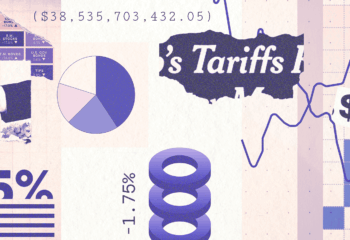Welcome to another sneak preview edition of Vested Interest, our forthcoming newsletter about what the financial and economic news might mean for your money, career, and life in general. Please get in touch via askwealthfront@wealthfront.com with comments and questions about other topics you’d like us to cover.
A few weeks ago, Bloomberg published an article about a new phenomenon in the world of American dairy products: People who are obsessed with super, super, super expensive butter. Like, butter that costs 15 times as much as the regular stuff and sells out immediately in hyped-up online flash sales. (There’s more fat in it and it tastes like fancy French butter, is the idea.) It was an entertaining article — and a good illustration of why some economists have growing concerns about the ways different groups of Americans are spending their money.
What do we mean by that? Well, viewed from afar, the U.S. looks like a train chugging happily along the tracks, economy-wise. The stock market is hitting record highs, which means investors as a whole expect American companies to earn a lot of money going forward. Consumer spending is steady, and given that “people buying things” is how companies make money in the present, that’s also good. The Federal Reserve is lowering interest rates, which typically leads to more spending and more growth because it makes borrowing easier. As the Bloomberg story notes, U.S.-made premium butter is meeting the growing demand for less-processed food and filling a need for American groceries created by tariffs on foreign goods.
Great! What’s not to love? The issue is who’s doing all the spending and investing and having happy economic feelings. What economists like KPMG’s Diane Swonk are noticing is that a lot of this activity is being driven by Americans at the very top of the income scale — the kind who buy ultra-high-end dairy products, for example. According to a recent analysis by Moody’s, half of U.S. spending, at the moment, is coming from the top 10% of earners.
The top one percent of wealthiest Americans own about half of the country’s stocks and mutual funds, too, which means they’re the ones who are reaping most of the benefits from the AI stock surge. And higher earners are just about the only group feeling good about their economic prospects right now in surveys of consumer sentiment.
But to play devil’s advocate: So what? Who cares who the money is coming from as long as it’s circulating through the economy and keeping people employed in Vermont’s thriving luxury butter industry, right?
Well, there are a few reasons to watch this closely. BCA Research equity strategist Irene Tunkel walked us through them — and what it starts with, she says, is that “the middle class is spending everything they’re making.” In other words, there is no wiggle room for most Americans, at the moment, to start spending more than they already are. One way that people sometimes address this is by engaging unsustainably risky borrowing to pay bills — think subprime mortgages before the Great Recession. Another is, well, spending less money. (The New York Times recently noted that demand for Hamburger Helper is on the rise.) And while saving instead of spending might be a wise move for individual families, it can be bad news for the companies that depend on their business.
People with higher incomes, meanwhile, don’t have to spend all the money they make, and they especially don’t have to spend it on luxury goods. It’s a lot easier to cut back on something like a $15 stick of butter than it is to stop paying the phone bill. And if high earners get spooked (by a high-profile bankruptcy or stock downturn, say) they might cut back on that kind of so-called “discretionary” spending.
If all of these possible events were to occur at the same time, it would have a negative ripple effect across the broader economy. But there are reasons to believe things might work out fine, too; the major banks that have announced earnings this quarter, for instance, say things are still going great. And to reiterate, actual overall consumer spending numbers themselves have been strong since June.
As to what it means for you? Whether or not you think luxury butter is a symbol of distorted spending patterns probably shouldn’t change your long-term strategy. The available evidence shows that trying to anticipate what the economy or the market will do is very, very hard. But thinking about what might happen can be worth doing when it comes to things like building up rainy-day funds and making decisions about career moves and potential major expenses — not to mention helping avoid the classic error of selling low and buying high in a panic after bad news hits. (Past results famously do not guarantee future performance, but there has not been a U.S. market crash yet that prices did not eventually recover from.)
Disclosure
The information contained in this communication is provided for general informational purposes only, and should not be construed as investment or tax advice. Nothing in this communication should be construed as a solicitation or offer, or recommendation, to buy or sell any security. Any links provided to other server sites are offered as a matter of convenience and are not intended to imply that Wealthfront Advisers or its affiliates endorses, sponsors, promotes and/or is affiliated with the owners of or participants in those sites, or endorses any information contained on those sites, unless expressly stated otherwise.
Investment management and advisory services are provided by Wealthfront Advisers LLC (“Wealthfront Advisers”), an SEC-registered investment adviser.
Wealthfront Advisers is a wholly-owned subsidiary of Wealthfront Corporation.
© 2025 Wealthfront Corporation. All rights reserved.
About the author(s)
Vested Interest covers the financial and economic news and what it might mean for your money, career, and life in general. View all posts by The Vested Interest editors



